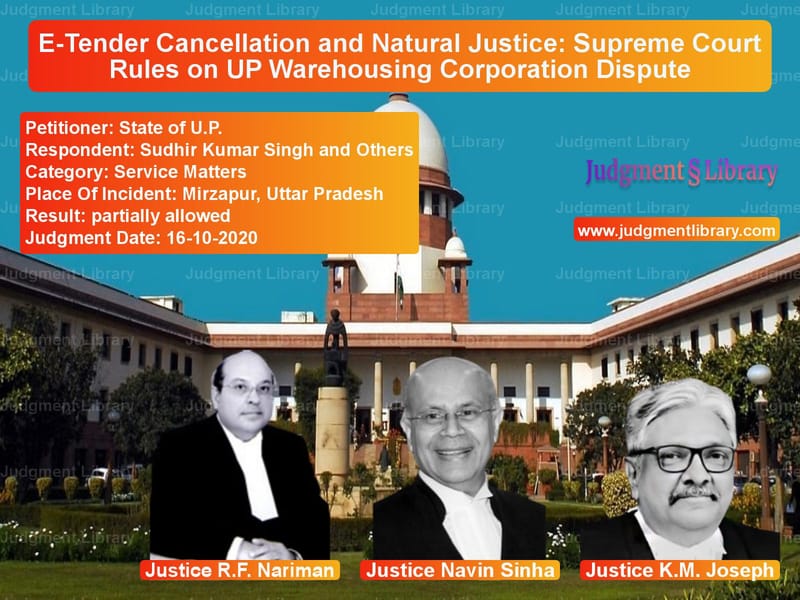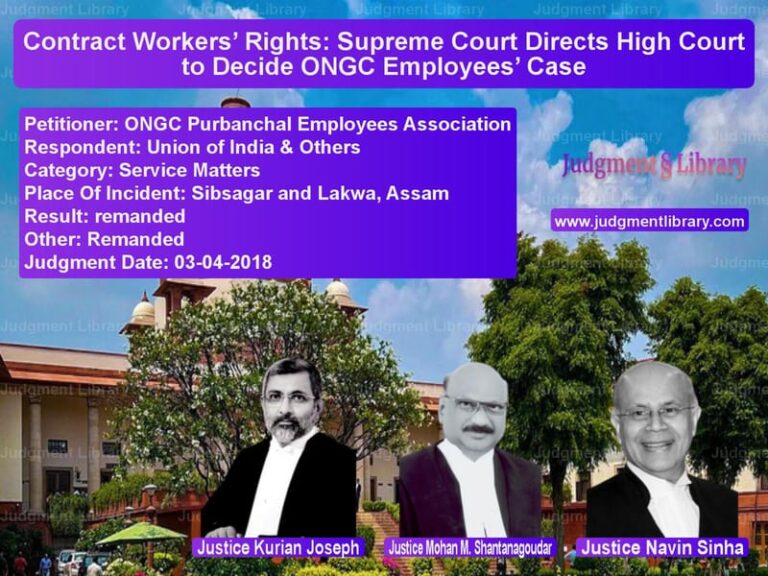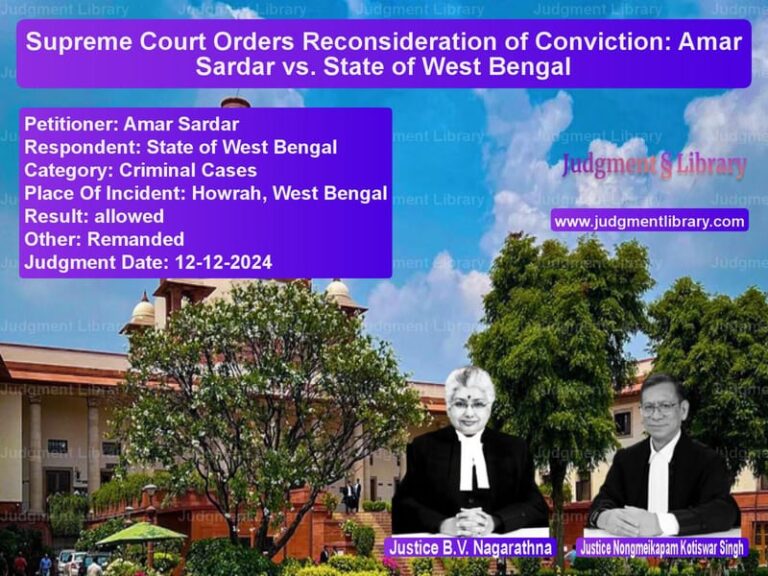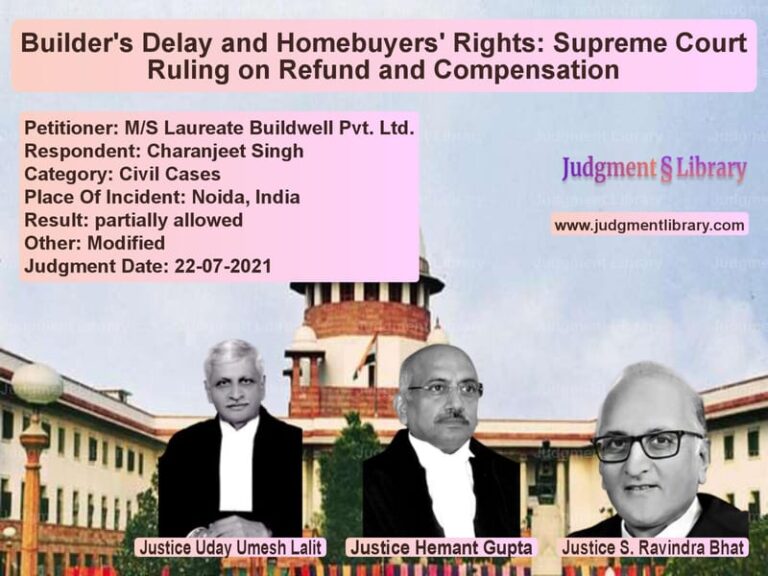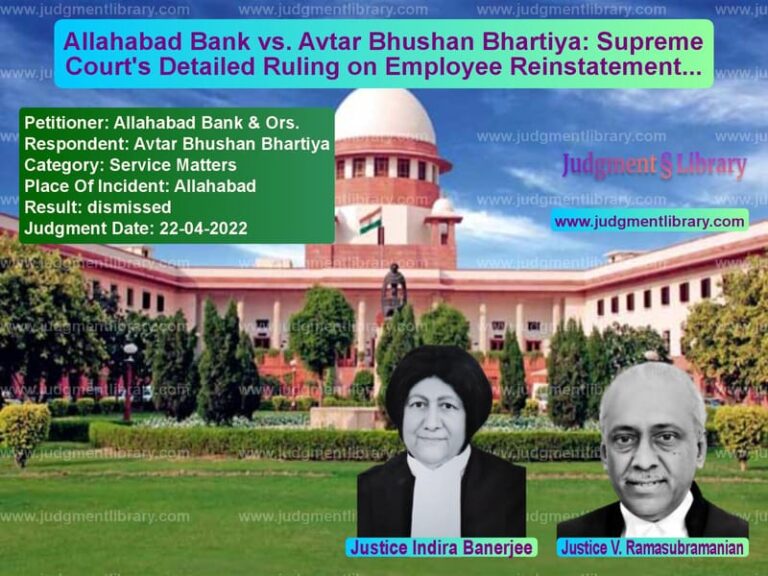E-Tender Cancellation and Natural Justice: Supreme Court Rules on UP Warehousing Corporation Dispute
The case of State of U.P. vs. Sudhir Kumar Singh and Others revolves around a legal dispute concerning the cancellation of an e-tender process by the Uttar Pradesh State Warehousing Corporation (UPSWC). The Supreme Court was called upon to determine whether the cancellation of the tender, after one year of contract execution, violated principles of natural justice and caused financial loss to the state.
The controversy arose when the Managing Director of UPSWC annulled the awarded tenders based on complaints of financial irregularities, without giving the contractors an opportunity to be heard. The case raises critical questions about government contracts, procedural fairness, and the extent to which natural justice applies in administrative decisions.
Background of the Case
On 6 January 2018, the UPSWC issued an e-tender for handling and transporting food grains and fertilizers in the Vindhyachal (Mirzapur) region. The tender covered several depots and centers for a two-year contract.
Key events in the tender process:
- 16 January 2018: The initial tender was canceled for “administrative reasons.”
- 1 April 2018: A fresh e-tender was issued.
- 17 April 2018: Technical bids were opened.
- 23 April 2018: Price bids of technically qualified bidders were opened.
- 4 May 2018: The Managing Director canceled the tender, citing impracticality.
- 1 June 2018: A new tender was floated, and contracts were awarded at significantly higher rates than before.
- 13 July 2018: Agreements were executed, and the work commenced.
However, in May 2019, complaints were lodged alleging financial irregularities in awarding these contracts at inflated rates. This prompted an ex parte investigation, culminating in the cancellation of the contracts on 26 July 2019.
Pleadings of the Parties
Petitioner’s (State of U.P.) Arguments
The petitioners contended that:
- The tender process was flawed, leading to inflated contract prices and financial loss to the state.
- The Managing Director was justified in canceling the contracts based on the findings of ex parte reports.
- There was no need for prior notice to the contractors, as the decision was made in public interest.
- The high court overstepped its jurisdiction by not only reinstating the contractors but also quashing related departmental actions.
Respondent’s (Contractors) Arguments
The respondents argued that:
- They had legally won the tender and invested heavily in executing the contract.
- The cancellation was arbitrary and violated natural justice, as they were not given an opportunity to respond.
- The tender had already been in effect for one year, and no complaints had been raised earlier.
- The financial loss claims were speculative and not proven through a fair process.
Supreme Court’s Judgment
The Supreme Court delivered a critical verdict, emphasizing:
- Natural Justice Must Be Followed: The Court ruled that the contractors were entitled to a fair hearing before the cancellation of their contracts.
- Violation of Due Process: The unilateral cancellation, based on ex parte reports, was deemed illegal.
- Financial Loss Argument Rejected: The Court noted that no clear evidence was presented to prove financial loss.
- Limited Scope of High Court’s Review: While upholding the contractors’ right to fair treatment, the Court held that the High Court had exceeded its authority by interfering in related administrative matters.
Key Observations by the Supreme Court
The Court strongly emphasized the importance of due process:
“Natural justice is at least as old as the first man created on earth – the biblical ‘Adam.’ No prejudice is caused to the person complaining of the breach of natural justice where such person does not dispute the case against him or it.”
Additionally, the Court stated:
“The State cannot act arbitrarily when dealing with contracts, especially when actions affect the livelihood of contractors who have invested time and resources into executing government projects.”
Conclusion
The Supreme Court ruled in favor of the contractors, quashing the cancellation of their contracts and directing the government to return their security deposits. However, it permitted the state to pursue further action through a lawful and fair process.
This judgment reinforces the necessity of procedural fairness in administrative actions, ensuring that contractual decisions made by the government comply with the principles of natural justice.
Petitioner Name: State of U.P..Respondent Name: Sudhir Kumar Singh and Others.Judgment By: Justice R.F. Nariman, Justice Navin Sinha, Justice K.M. Joseph.Place Of Incident: Mirzapur, Uttar Pradesh.Judgment Date: 16-10-2020.
Don’t miss out on the full details! Download the complete judgment in PDF format below and gain valuable insights instantly!
Download Judgment: State of U.P. vs Sudhir Kumar Singh a Supreme Court of India Judgment Dated 16-10-2020.pdf
Direct Downlaod Judgment: Direct downlaod this Judgment
See all petitions in Recruitment Policies
See all petitions in Public Sector Employees
See all petitions in Contract Disputes
See all petitions in Judgment by Rohinton Fali Nariman
See all petitions in Judgment by Navin Sinha
See all petitions in Judgment by K.M. Joseph
See all petitions in partially allowed
See all petitions in supreme court of India judgments October 2020
See all petitions in 2020 judgments
See all posts in Service Matters Category
See all allowed petitions in Service Matters Category
See all Dismissed petitions in Service Matters Category
See all partially allowed petitions in Service Matters Category

